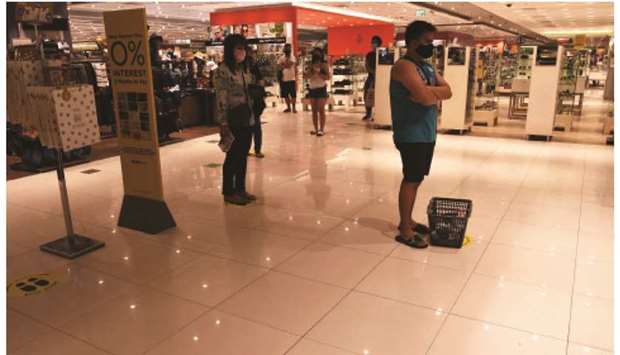Malls that have reopened after the easing of quarantine rules but fail to enforce the physical distancing rule would be shut down again, Interior Secretary Eduardo Ano has warned.
He issued the warning after photos circulating online showed huge crowds in some supermarkets inside shopping centres defying the quarantine protocol.
Malls and other establishments were back in business, following the relaxation of the two-month coronavirus lockdown, subject to strict regulations that included safe distancing and the wearing of face masks.
Metro Manila and other areas shifted from enhanced community quarantine (ECQ) to modified ECQ (MECQ).
Ano directed all local government units and the Philippine National Police’s Joint Task Force Covid Shield to inspect malls and remind their management to strictly enforce health protocols.
Failure to comply with the minimum health standards could be grounds for shutting down a mall and suing its owners for violating Republic Act 11469 or the “Bayanihan to Heal As One Act.”
LtGen. Guillermo Eleazar, commander of the Joint Task Force Covid Shield, made the same warning to mall security managers who were primarily tasked to implement the physical distancing measure.
The names of malls and other business establishments that fail to enforce physical distancing have been transmitted to concerned police commanders, according to Eleazar.
“These commanders were instructed to warn the management of these malls and make sure that the warning be personally relayed to the mall management and other similar establishments,” he said in a statement.
Security guards, as well as mall employees, were also directed to be on regular patrol inside malls to see to it that physical distancing is observed.
Palace spokesman Harry Roque Jr was equally alarmed at the shoppers’ seeming disregard of the health measure.
“We must understand that we have started to slowly ease restrictions in order to revitalise the economy, and not because we are safe. We must learn from other countries like South Korea, which contained the spread of the virus but later experienced a spike in Covid-19 cases when citizens became relaxed,” Roque said in a statement.
The omnibus guidelines of the Inter-Agency Task Force for the Management of Emerging Infectious Diseases (IATF-EID) provides that under an MECQ, particular businesses and offices may operate but at 50% operational capacity.
Under the guidelines, “commissioned shuttle services for employees of permitted offices or establishments, as well as point-to-point transport services provided by the government shall be allowed to operate, giving priority to healthcare workers.”
President Rodrigo Duterte, who stayed in Malacanang for 67 days, flew to Davao City when the ECQ was lifted on Saturday. The president was in Davao City not only to visit his family but also to assess the coronavirus disease 2019 (Covid-19) situation in Mindanao, Roque said.
The huge, unsupervised crowds in shopping malls also worried a number of senators.
Senate President Pro Tempore Ralph Recto, and Senators Maria Lourdes Nancy Binay, Panfilo Lacson and Emmanuel Joel Villanueva warned of a “second wave” of Covid-19 infection if people in MECQ areas ignore health protocols.
Recto texted that he expected “more infections without proper (physical) distancing and non-wearing of masks. We must continue reminding people only to go out for essentials and to practice social distancing and wearing masks and that the virus has not yet been defeated.”
“We haven’t gone past the first wave yet, so I’m not sure about a second wave. I think the IATF should reconsider its decision on the opening of the malls and other similar establishments unless strict physical distancing and other protocols are observed,” Lacson said.
For Binay, what is worrisome “is that when the IATF declared some areas as GCQ and MECQ, the LGUs (local government units) — and even national agencies — are not even prepared, or even near in realising the Covid-19 strategy which is supposed to be already in a satisfactory operational level by this time.”
“That’s why this ‘second wave,’ we all know that it’s not a question of if, but when. And based on the overcrowding yesterday, well, don’t expect just a second wave — prepare for a tsunami!” Binay said.
Villanueva said the reports of “people crowding open establishments on the first day of the transition period starting on Saturday is alarming.”
“If we continue with this practice, we will expect a surge of infection in the coming days,” he said.

Customers observing social distancing measures while waiting in a queue to pay a cashier at a mall in Manila, yesterday.
